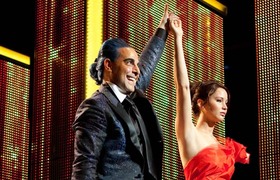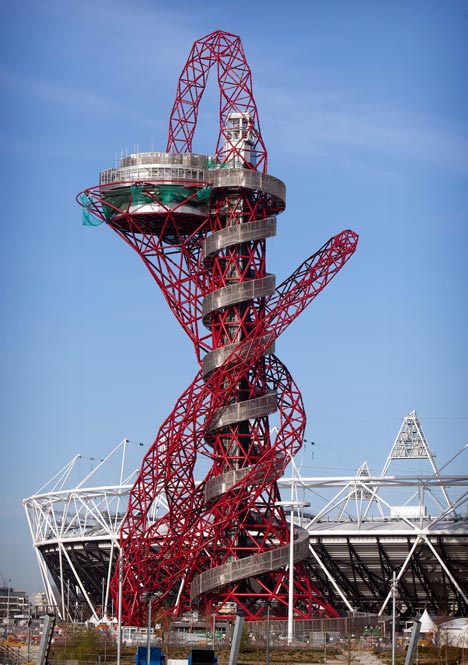The London Hunger Games
Wed. August 8, 2012Categories: Abstract Dynamics
 |
 |
Welcome to the Hunger Games. The function of the Hunger Games is to suppress antagonism, via spectacle and terror. In the same way, London – 2012 preceded and accompanied by the authoritarian lockdown and militarisation of the city – are being held up as the antidote to all discontent. The feelgood Olympics, we are being assured, will do everything from making good the damage done by last year’s riots to seeing off the “threat” of Scottish independence. Any disquiet about London 2012 is being repositioned as “griping” or “cynicism”. Such “whinging”, it is claimed, assumed its proper place of marginality as the vast majority enjoy the Games, and LOCOG is vindicated.
The Olympics semiosphere is one from which all negativity must be banished. Witness this masterpiece of circularity, in a blog defending Coca Cola and McDonalds’ sponsorship of the Games.
- Considering they have both recently signed long extensions of their contracts and the Olympics are just days away it was rather irresponsible of Jaques Rogge to be in any way negative about such committed Olympic sponsors. Especially because it has also brought negativity to the IOC and the Olympic Games at a crucial period.
Negativity is bad because it brings negativity! The BBC is even periodically running a little film about the importance of positive thinking (even though positive thinking can result in worse outcomes).
Sadly, Charlie Brooker has joined those who think that negativity about the Games was overplayed. But once the Olympic floodlights are turned off, most will switch back from an attitude of mild interest to indifference towards even the most dramatic Olympic sports, never mind those many Olympic sports which plainly have limited specator appeal. This isn’t the point though: disquiet about London 2012 was never necessarily based in any hostility towards the sports. Enjoyment of the sport and loathing for LOCOG and the IOC are perfectly compatible.
Cynicism is just about the only rational response to the doublethink of the McDonalds and Coca Cola sponsorship (one of the most prominent things you see as you pass the Olympic site on the train line up from Liverpool Street is the McDonalds logo). As Paolo Virno argues, cynicism is now an attitude that is simply a requirement for late capitalist subjectivity, a way of navigating a world governed by rules that are groundless and arbitrary. But as Virno also argues, “It is no accident … that the most brazen cynicism is accompanied by unrestrained sentimentalism.” Once the Games started, cynicism could be replaced by a managed sentimentality. The BBC has given itself over to propagating an hysterical PR delirium, as Mike Marqusee described after seeing the boxing at ExCel:
- Breathless BBC commentators reiterate the same round of superlatives “unbelievable”, “incredible”, “amazing,” “brilliant,” “unbelievable” telling us again and again how unique, how special, how extraordinary these Olympics are. It feels like they’re the ones on performance-enhancing drugs, not the usually sober, poised and realistic competitors.
Sadly, at the ExCel, after the refreshment of the boxing came the utterly formulaic torpor of a video package in which celebrities waxed banal on the “atmosphere” that makes the Olympics special and the “unforgettable” moment we’re privileged to be part of.
Affective exploitation is crucial to late capitalism. The BBC’s own Caesar Flickerman (the interviewer who extracts maximum sentimental affect from the Hunger Games contestants before they face their deaths in the arena) is the creepily tactile trackside interviewer Phil Jones. Jones’s “interviews” with exhausted athletes, are surely as ritualised as any Chinese state broadcast. Emote. Emote again. Emote differently. Praise the crowd.
It is via emotion that advertising can make the spurious connection between brands and the sport, but, as Marqusee points out, PR boosterism cannot tolerate the very thing which makes sport so fascinating – its unpredictability, the fact that high drama is not guaranteed.
The point of capital’s sponsorship of cultural and sporting events is not only the banal one of accruing brand awareness. Its more important function is to make it seem that capital’s involvement is a precondition for culture as such. The presence of capitalist sigils on advertising for events forces a quasi-behaviouristic association, registered at the level of the nervous system more than of cognition, between capital and cultural. It is a pervasive reinforcement of capitalist realism.
There is a strange duality of the Olympics – such that, surrounding the Games, there can be a semioblitz of commercial exploitation, but, in the spaces where the athletes compete, there is a coy chasteness about advertising, so that even the O2 has to be renamed North Greenwich Arena for the duration of London 2012. Of course, the reason for this is so only those who pay the IOC for the privilege can commercially exploit the Games. Nevertheless, these zones from which capitalist semiotic pollution has been minimised make a pleasant contrast with the ubiquitous tawdry hucksterism elsewhere, inviting us to imagine the Games without capital.
But we don’t have to. It’s clear that what people are already enjoying in the Games is everything for which Capital is not responsible: the efforts of the athletes, the experience of a shared publicness. Insofar as the torch relay was a success, this, too, was not due to the parade itself – a dreary countrywide corporate carnival, consisting of Samsung, Coca Cola and Lloyds TSB floats – but because it allowed people to experience their own sociality. Note also, for instance, that the improved British performance which has the BBC in such a jingoistic froth was likely due to (the privatised-public) National Lottery funding rather than corporate sponsorship.

Nothing could be clearer example of Negri’s claim that capital is essentially parasitic than the Games. Capital’s contribution to London 2012 has been systematically overpriced and shoddy: whether it be the branding, with its infantile colouring and lettering (we’ve grown use to the logo, but, really, has there been a more embarrassingly inept logo in the history of the world for an event of this magnitude?), the soon to be demolished Olympic stadium, magnificent only in its mediocrity, and the grand folly of the ArcelorMittal Orbit. The ArcelorMittal Orbit is perhaps the best symbol of capital’s parasitic relation to the London 2012 Games. The echo of Vladimir Tatlins Monument to the Third International tells you an awful lot about the impasses, inertia and sterililty of capitalist realist culture. As Douglas Murphy points out, comparing the Orbit to Vladimir Tatlins Monument to the Third International, “[w]hereas Tatlins twists were a yearning evocation of the teleological thrust of dialectical materialism, the Orbits creators, in their design statement, merely explain that it should make an iconic statement about ‘Tower-ness'”.
As Juliet Jacques has argued, the “deconstructed tower” is – unwittingly – the perfect monument for capitalist realist Britain.
- With its funding and name coming mostly from billionaire Lakshmi Mittals integrated steel company, who provided up to £19.2m towards its costs, with the rest given by the London Development Agency, the Orbit is less a radical structure than an utterly conservative one. In saying that it would pay for itself through the renting of private dining spaces at its summit, Boris Johnson may have said more about its legacy than he planned when he described it as a corporate money-making venture. In that, Kapoor and Balmonds Orbit captures the spirit of its time and place as much as Eiffel or Tatlins designs but perhaps not quite as they intended.